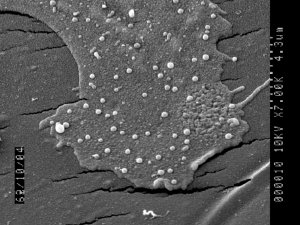Apr 28 2010
A $145-million Federal Government effort to harness the power of nanotechnology to improve the diagnosis, treatment, and prevention of cancer is producing innovations that will radically improve care for the disease. That's the conclusion of an update on the status of the program, called the National Cancer Institute Alliance for Nanotechnology in Cancer. It appears in ACS Nano, a monthly journal published by the American Chemical Society: "Recent Advances from the National Cancer Institute Alliance for Nanotechnology in Cancer."
Piotr Grodzinski and colleagues note in the article that the alliance, launched in 2004, funds and coordinates research specifically intended to move knowledge about the small science out of laboratories and into hospitals and doctors offices in a big way. It builds on more than 50 years of advances in cancer care that although substantial, still leave cancer as the No. 1 cause of death in the United States and globally.
 Gold nanoparticles, the bright structures attached to the cultured human cell in this electron microscope image, are among the ultra-small technologies that may help improve the diagnosis and treatment of cancer in the future. Credit: Dr. Catherine C. Berry; National
Science Foundation
Gold nanoparticles, the bright structures attached to the cultured human cell in this electron microscope image, are among the ultra-small technologies that may help improve the diagnosis and treatment of cancer in the future. Credit: Dr. Catherine C. Berry; National
Science Foundation
The article describes a range of advances, including some showing significant promise in clinical trials that are poised to make a big impact on cancer. They promise earlier disease diagnosis, highly targeted treatments that kill cancer cells but leave normal cells alone, fewer side effects, and improved survival, the article indicates.